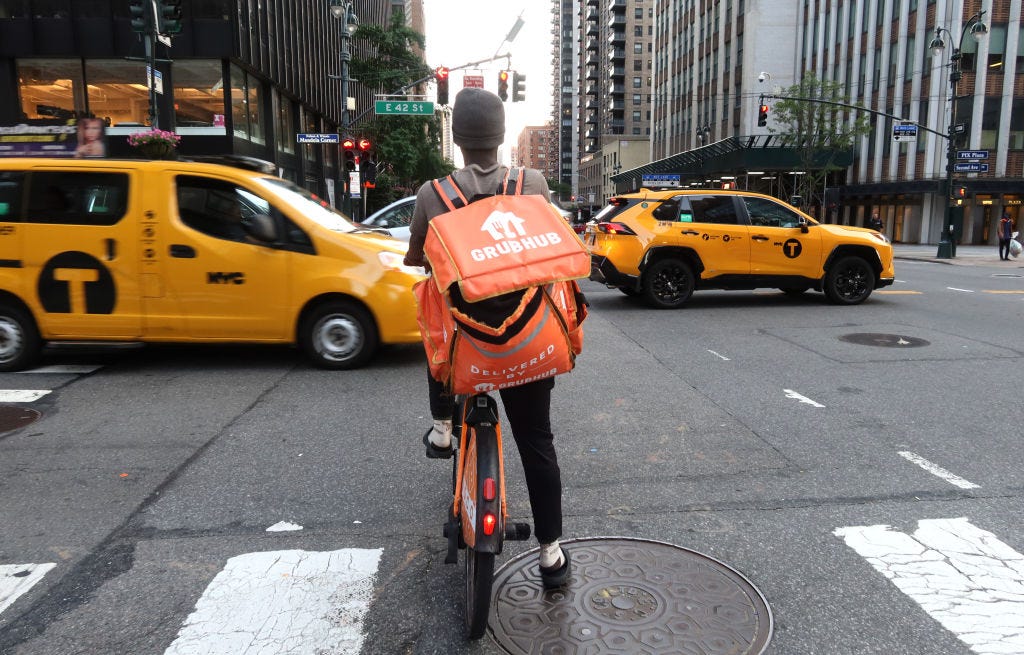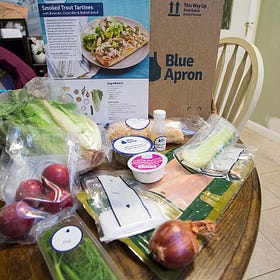Wonder might buy Grubhub
Wow, okay! The wannabe mealtime super-app is sizing up a delivery OG
UPDATE Wednesday, 11/13: It’s official! Wonder will acquire Grubhub for $650 million. If you’re keeping score (we are), that’s less than 10 percent of what Just Eat Takeaway paid for the company less than five years ago. The deal is expected to close in early 2025.
On Tuesday afternoon in a story that is *chef’s kiss* perfect for this newsletter, the Wall Street Journal reported that Grubhub may have finally found a buyer. Wonder, a food delivery startup of a different kind from billionaire serial entrepreneur Marc Lore, is reportedly in advanced talks to buy the beleaguered US food delivery service, which has been trying to sell itself since 2022.
The Journal didn’t share terms or specifics but did say Grubhub is likely to be valued under $1 billion in any deal. It was previously acquired in 2020 by Amsterdam-based Just Eat Takeaway for $7.3 billion. Oof.
Wonder is potentially, according to its founder, “the Amazon of food and beverage.” It’s trying to create a mealtime super-app, changing the way we access food. It is a tall, though extremely well-funded order. Still, I wouldn’t have guessed the upstart had its eye on an ailing restaurant delivery service launched 20 years ago.
Wonder, once the startup that made dinner outside your house in a van, pivoted hard to brick-and-mortar locations in 2023.
By that time, it was already worth a reported $3.8 billion. In March, the New York Times reported Lore had sunk $200 million of his own money into Wonder, with plans to add another $100 million. Lore told the Times he’s targeting an IPO in three to five years with a valuation of $30 billion. (For context, DoorDash is worth around $70 billion today.)
Since reporting a story about Wonder for Eater in April, I’ve joked that the startup is one of the rare third-party companies that chefs and restaurants say they love. Except it’s not a joke, because it’s true. Wonder pays chefs and restaurants for their intellectual property — recipes — then reworks them to be easily replicated using precise ingredient measurements and minimal equipment. Chefs and restaurateurs I spoke with earlier this year praised Lore and his investment in the restaurant industry, insinuating, if not asserting, that his particular combination of capital and business acumen has helped them grow in previously unimaginable ways.
New York City chef JJ Johnson told me that during the recipe development phase for his Wonder-exclusive concept, Bankside, the culinary team measured spices down to the microgram, or one-millionth of a gram. It sounds outrageous, but that’s the point — the idea is outrageous. (In fact, I heard this particular factoid was mocked in New York restaurant satirist Eli Sussman’s Instagram stories, but I didn’t catch it.)
Wonder’s brick-and-mortar business includes 35 locations in a handful of states, several inside of Walmart stores. (Lore ran e-commerce at Walmart after the retail giant bought another of his companies for billions of dollars.) Wonder’s locations can house up to 30 different restaurant brands, and meals placed via mobile app can be cooked, then picked up or delivered quickly. Wonder taps some third-party services to deliver, but it also acquired New York’s Relay delivery service earlier this year, and with it, a fleet of dedicated bike couriers able to deliver food in a matter of minutes.
Another arm of Wonder puts its restaurant brands into larger venues, like convention centers and hotels. And just over a year ago, Wonder bought Blue Apron, then a publicly traded meal kit company once worth $2 billion. It took over at a price of $13 per share, or about $103 million, a significant premium over Blue Apron’s market price, hovering around $5 per share.
related content:
A tale of two food intermediaries
During a trip to New York two weeks ago, I passed the new Brooklyn outpost of Wonder, on Schermerhorn street just a block from my hotel. I wouldn’t have noticed it but for a deflating tower of giant green balloons outside its front door, the smell of latex in the sun wafting down the street.
So… why Grubhub?
Per the Journal, “Buying Grubhub would boost Wonder’s revenue as it continues to raise money. It also offers a direct source of delivery drivers and related technology.”
Makes sense. Wonder is also among the few players that could save the ailing service. Once the country’s online delivery leader, Grubhub has ceded most of the market to younger rivals DoorDash and Uber Eats. A strategic deal with Amazon announced in May provided a lifeline; it lets shoppers on Amazon.com and the Amazon mobile app order food from restaurants. The deal puts Grubhub’s brand in front of hundreds of millions of Amazon shoppers and gives some of them free delivery: Amazon Prime members receive free access, indefinitely, to Grubhub+, the company’s subscription-based free delivery and discount offering. (At the time, Amazon increased its stake in Grubhub, and was on track to eventually own as much as 18 percent of Grubhub’s shares, though I haven’t followed up on the details since the announcement.)
related content:
Will Amazon save Grubhub?
On Thursday, Amazon and Grubhub shared some news: Shoppers on Amazon.com and the Amazon mobile app can now order food from restaurants, thanks to a revamped Grubhub partnership. The…
We first learned Grubhub was in trouble during a particularly precarious earnings call in late 2019 that is the stuff of restaurant technology lore. Then-CEO Matt Maloney lamented “promiscuous diners” leaving Grubhub for other delivery platforms. Grubhub’s stock dropped 30 percent on the news and by early 2020, it was looking for a buyer.
At first, it seemed likely Uber would snap up the service, but it instead went to Just Eat Takeaway. The deal closed in the summer of 2021, and mere months later an activist investor called for a sale. By April 2022, JET admitted it wanted out.
All this to say: this is an attractive deal on both sides. But until a deal is signed this is all just speculation, and as the Journal notes, it could still fall apart. More soon 🤞






